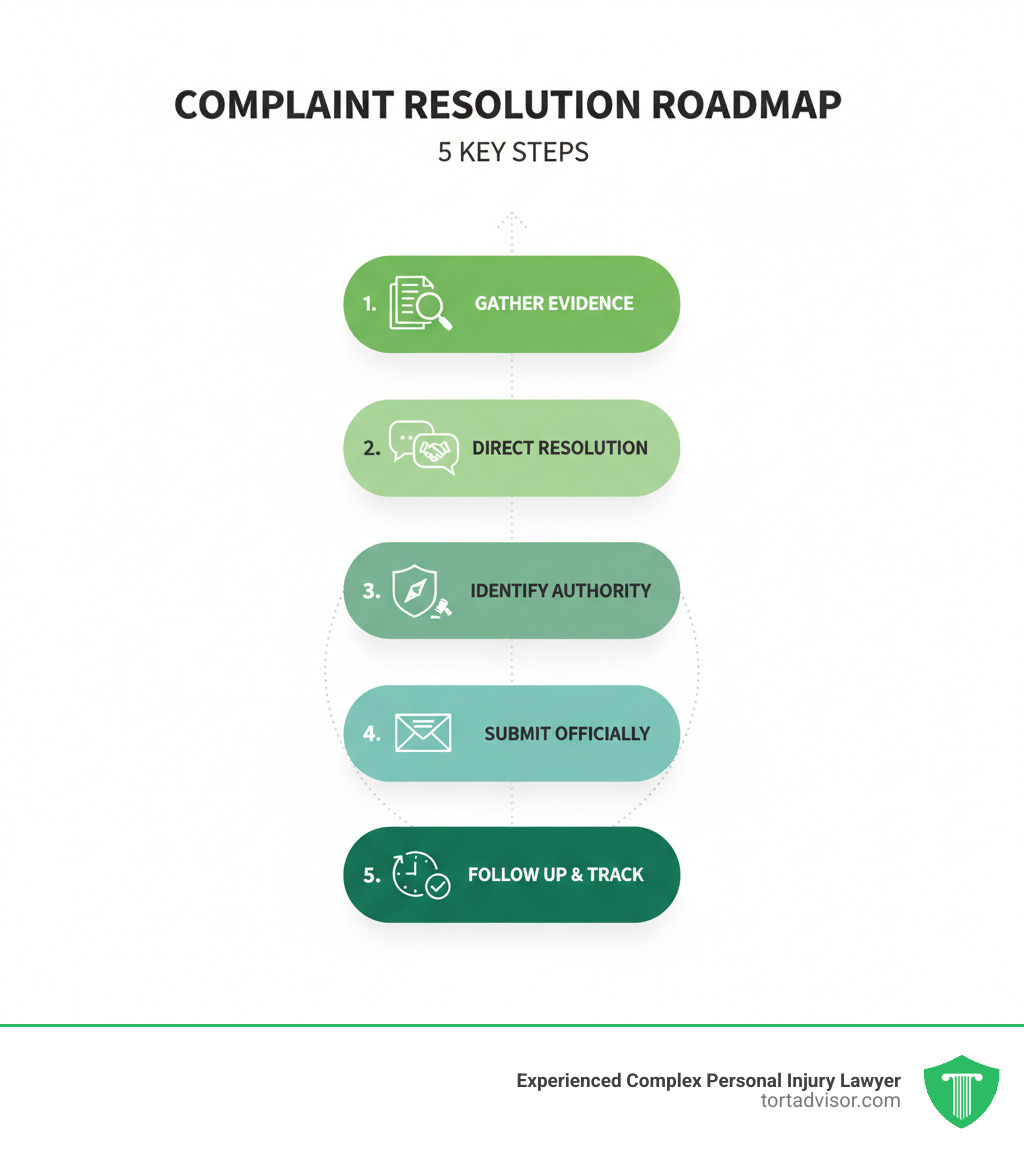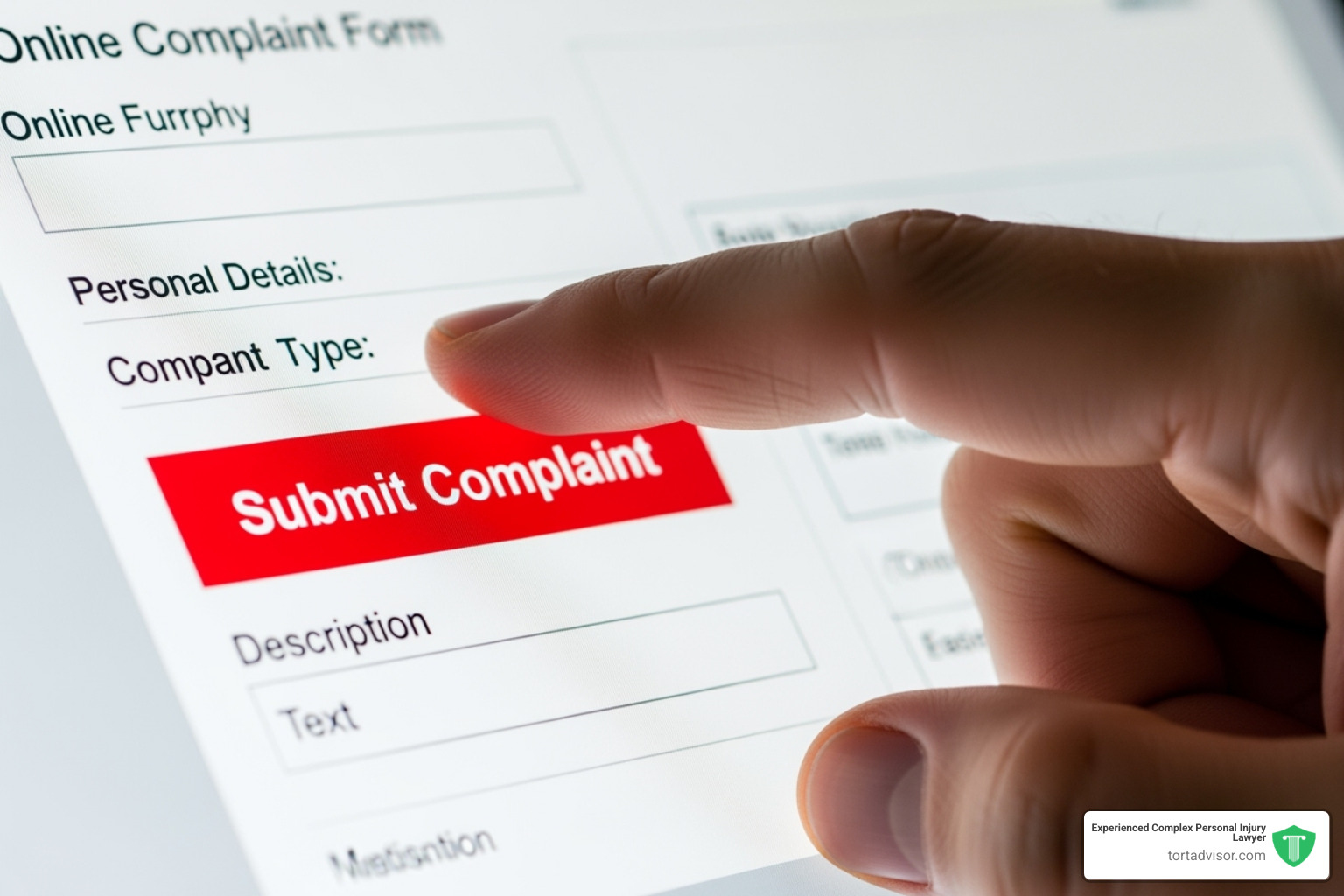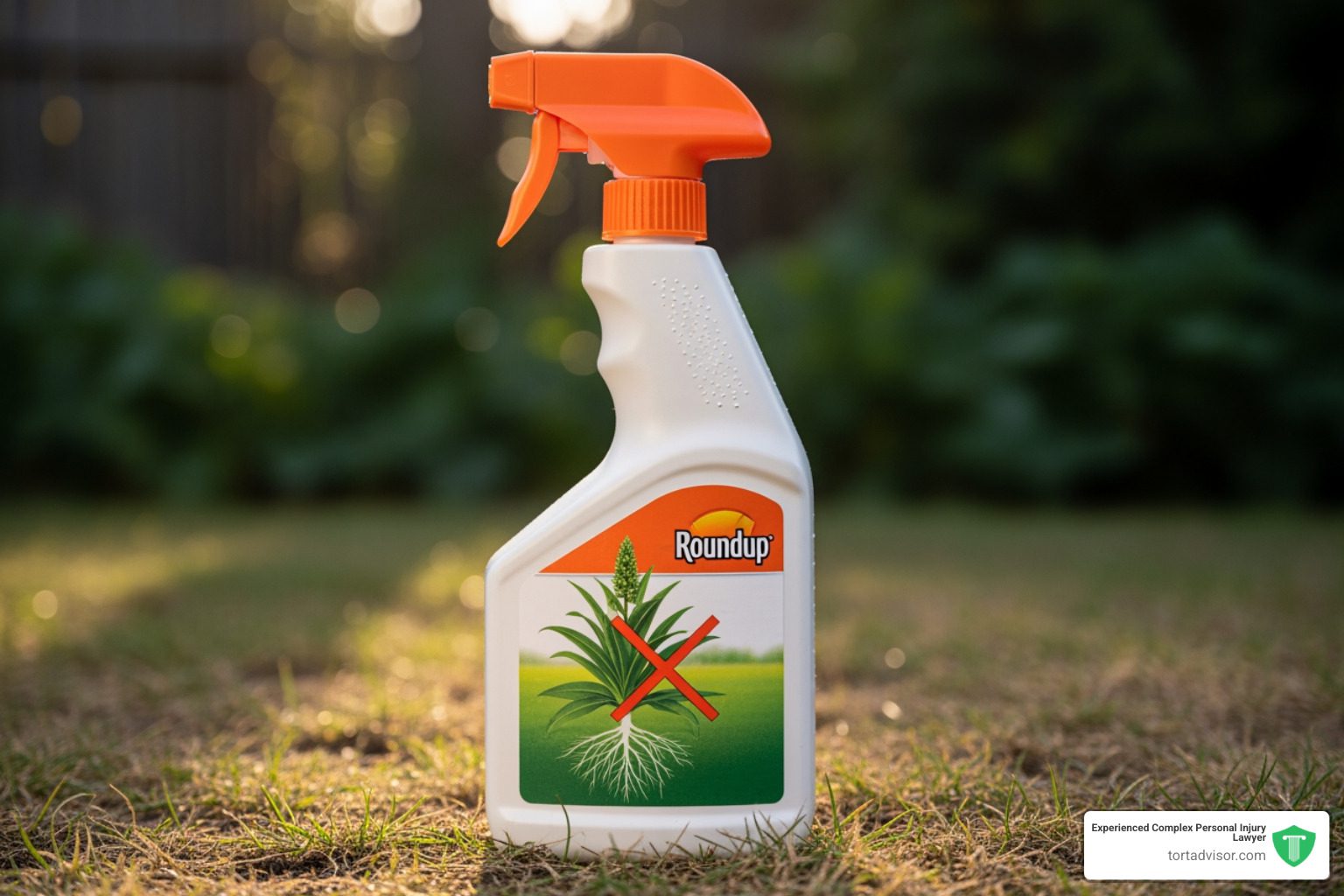


Your Guide to Making Your Voice Heard
Knowing how to file complaint against a business or employer is crucial. The right process can mean the difference between getting results and being ignored. Here’s a quick roadmap:
Essential Steps to File a Complaint:
- Document everything – Keep records, receipts, and communications.
- Try direct contact first – Give the company a chance to resolve it.
- Choose the right agency – Match your complaint to the correct authority.
- File promptly – Many complaints have deadlines.
- Follow up – Track your complaint status.
For issues like unsafe work conditions, unpaid wages, or defective products, filing with a government agency is your first line of defense. Agencies like OSHA, the Consumer Financial Protection Bureau (CFPB), and the Department of Transportation (DOT) have streamlined systems to help you.
Most companies respond to complaints within 15 days when filed through official channels like the CFPB. Agencies also use this data to spot trends and take action against repeat offenders.
I’m Mason Arnao. My experience has shown that proper documentation and following the right process when you learn how to file complaint can dramatically improve your chances of success. This guide will walk you through the steps to make your voice heard.
Essential how to file complaint terms:
- do i need a personal injury lawyer
- what can a personal injury lawyer do for you
- how much does a personal injury lawyer cost
Step 1: Prepare Your Case Before You File
Effective complaints start with good preparation. Before filing, try to resolve the issue directly with the company. A simple call or email can often solve the problem quickly and shows good faith if you need to escalate the complaint later.
As you communicate, document everything. Keep a timeline of events, including dates, times, and who you spoke with. Save all related emails, texts, receipts, and contracts. This documentation is the backbone of your complaint and is far more persuasive than relying on memory alone.
Sometimes you might not feel ready to take immediate action. That’s okay. What if I’m not ready to take legal action now? You have time to gather your thoughts.
What Information Do I Need to Provide?
When you file a complaint, be organized. Clear, complete information helps agencies process your case efficiently. Gather the following:
- Your contact information: Full name, address, phone, and email.
- Business contact information: The company’s full legal name, address, phone, and website.
- Dates and amounts: The date of the incident and any financial details like payments or damages.
- Problem description: A factual, chronological account of what happened. The CFPB recommends being clear and concise.
- Desired resolution: State clearly what you want (e.g., a refund, replacement, apology).
- Supporting documents: Include copies (not originals) of receipts, contracts, and emails. Some agencies like the CFPB have upload limits.
- Photos or videos: Visual evidence is powerful for product defects or property damage.
Complaint vs. Review vs. Tip
It’s important to know the difference between a complaint, a review, and a tip, as each serves a different purpose.
- A complaint is a formal request for an authority to investigate and help you get a resolution. It triggers an official process where the agency contacts the business for a response.
- A review shares your experience publicly to inform other consumers. It might pressure a business but doesn’t start an official investigation.
- A tip provides information about potential wrongdoing without seeking a personal resolution. It helps agencies spot trends and build cases against bad actors.
For a personal resolution, filing an official complaint is the most effective path.
Step 2: Find the Right Place to File Your Complaint
Filing your complaint with the right agency is critical. Sending it to the wrong place causes delays or results in no action. Here’s a breakdown of which agency to contact based on your issue.
For General Consumer Issues and Scams
- State Attorney General’s office: This is a great starting point for issues like deceptive business practices. They can mediate disputes or take legal action. Find your state’s AG easily online.
- Federal Trade Commission (FTC): For scams or fraud, report to the FTC. While they don’t resolve individual cases, your report helps them identify and stop fraudsters. Report fraud to the FTC online.
- Adult Protective Services (APS): For financial exploitation or abuse of older adults or individuals with disabilities, contact your local APS agency. Use the Eldercare Locator for senior-related issues or call (800) 677-1116 to find your local agency.
For Financial Products and Services
For problems with banks, credit cards, loans, or other financial services, contact the Consumer Financial Protection Bureau (CFPB). This federal agency was created to protect consumers in the financial marketplace.
The CFPB handles complaints about mortgages, credit cards, debt collection, student loans, and more. The agency is effective; most companies respond within 15 days. When you file a complaint, you also contribute to a database that protects other consumers. You can start a new CFPB complaint online.
For Workplace Safety, Wages, and Discrimination
When employers violate workplace laws, specific agencies can protect you.
- Occupational Safety and Health Administration (OSHA): OSHA handles unsafe conditions and retaliation for reporting them. OSHA notes that signed complaints are more likely to result in inspections. Learn about your rights under whistleblower protection laws.
- Wage and Hour Division (WHD): For unpaid wages and overtime disputes, contact the WHD. They enforce federal pay laws, and investigations are confidential.
We understand that speaking up at work can feel risky. What if the abuse happened at work but I’m afraid of losing my job?
For Specific Industries: Airlines, Telecom, and More
Some industries have their own specialized watchdog agencies.
- Department of Transportation (DOT): For airline issues like baggage problems, flight delays, or discrimination, contact the DOT. Airlines must acknowledge DOT complaints within 30 days and respond in writing within 60 days.
- Federal Communications Commission (FCC): For phone and internet issues like robocalls or billing disputes, file with the FCC. Your complaint helps the FCC track consumer issues.
If you’re unsure where to file, check out usa.gov for a directory of agencies.
Step 3: The Official Process of How to File a Complaint
Submitting your complaint is more user-friendly than ever. Most agencies offer streamlined, accessible ways to file a complaint.
What Are the Different Methods for Filing?
Agencies offer multiple filing options for your convenience:
- Online forms are the standard for most agencies, like the CFPB. They are efficient, allow for document uploads, and provide instant confirmation.
- Phone hotlines are also available. For example, you can contact the WHD at 1-866-487-9243. A representative can guide you through the process.
- Mail-in letters are still an option. For proof of delivery, use certified mail with a return receipt.
- In-person visits to local offices, like those for OSHA and the WHD, are available for hands-on help.
Are There Deadlines or Time Limits?
Timing is critical when you file a complaint. Missing a deadline can mean losing your right to get help. Deadlines vary significantly by agency and issue.
For example, OSHA whistleblower complaints must be filed within 30 to 180 days, depending on the specific law. OSHA safety complaints generally have a 6-month deadline. The CFPB is more flexible but gives you 60 days to respond to a company’s reply.
The best advice is to file your complaint as soon as possible. This ensures evidence is fresh and you don’t miss any deadlines. You can learn more about filing deadlines and learn how long you have to file a lawsuit.
Can I File a Complaint Anonymously?
Yes, many agencies accept anonymous complaints to protect filers from retaliation.
WHD complaints are confidential. The agency will not disclose your name or the fact that a complaint was filed. OSHA accepts anonymous reports, but they state that a signed complaint is more likely to result in an inspection because it adds credibility.
Confidentiality protections allow you to provide your name to make the complaint more effective while the agency keeps your identity private from the company.
Step 4: After You Submit: The Complaint Lifecycle
Submitting your complaint is just the beginning. Understanding the lifecycle is key to knowing how to file complaint effectively.
What Happens After I Submit a Complaint?
Submitting a complaint starts a mediated conversation between you, the agency, and the business.
- Agency Review: An agency reviewer checks your complaint for jurisdiction and completeness. They may contact you for more information.
- Forwarding: The agency forwards the complaint to the business. This is an official notice that companies take seriously.
- Response: Companies have a specific timeframe to respond. For example, the CFPB requires a response within 15 days, and the DOT requires airlines to respond within 60 days.
- Investigation: Some complaints trigger a full investigation. The WHD may interview employees and review records, while the DOT thoroughly reviews discrimination complaints.
How Can I Track the Status of My Complaint?
Most agencies provide a complaint ID or case number. Keep this number to track your complaint’s status. Agency portals and email updates will keep you informed at key stages of the process.
If you have questions, contact the agency. For example, you can check the status of your CFPB complaint online. Stay engaged and follow up if you don’t hear back within the expected timeframe.
What Are the Potential Outcomes?
Potential outcomes include tangible results like refunds and reimbursements. Other resolutions include correction of records, repairs, replacements, or an apology. Your complaint can also lead to broader company policy changes, helping other consumers.
In some cases, agency enforcement action, such as fines or legal injunctions, can be taken against companies with repeated violations.
Agency complaints typically don’t provide compensation for personal injuries. For that, you may need to consider legal action. Learn more about what kind of compensation could victims receive.
When a Complaint Isn’t Enough: Considering Legal Action
An agency complaint may not be enough, especially for significant harm or injury. Agencies enforce regulations but typically cannot award damages for medical bills, lost wages, or personal suffering. This is where legal action becomes necessary.
Filing a complaint is like asking a referee to enforce rules. If you’ve already been seriously injured, you may need to go to court to seek compensation.
Understanding Your Legal Rights
Laws protect consumers and employees from negligence and wrongdoing. Understanding these rights helps you decide whether to pursue legal action.
- Consumer protection laws protect you from faulty products and unfair practices. If you’re injured or suffer financial loss, a lawsuit can provide compensation for your damages.
- Employee rights ensure a safe workplace and fair treatment. If an employer’s violation causes injury or financial harm, you may have grounds for a lawsuit.
- You have the right to a safe environment on business properties. If you’re injured due to negligence (e.g., a slip and fall), you can seek compensation.
Navigating the legal system can be complex. For significant injuries, a lawyer can assess your case and explain your options. Find out if you Do I Need a Personal Injury Lawyer?
From Complaint to Lawsuit
You might move from a complaint to a lawsuit if the harm is substantial or the agency process was unsatisfactory.
- Personal injury cases involve injuries from another’s negligence (e.g., car accidents, slip and falls). They aim to secure compensation for medical bills, lost wages, and pain and suffering.
- Product liability lawsuits are for injuries caused by defective products. A recall won’t cover your medical bills, but a lawsuit can.
- Wrongful termination or discrimination cases may escalate to a lawsuit if an EEOC complaint doesn’t provide adequate relief, allowing you to seek damages.
The key difference: an agency complaint enforces rules, while a lawsuit seeks compensation for serious injuries and losses. An experienced lawyer can determine if you have a viable claim. Learn What Can a Personal Injury Lawyer Do For You?
Frequently Asked Questions about Filing Complaints
Here are answers to common questions about how to file complaint:
What’s the most important thing to include in my complaint?
The most important part is a clear, factual description of the problem. Explain what happened, what you’ve done to resolve it, and what you want as a resolution. Always include supporting documents like receipts or photos to strengthen your case.
Can my employer fire me for filing a complaint about workplace safety?
No. It is illegal for an employer to retaliate against you for filing a complaint about issues like workplace safety or wage violations. You are protected by strong whistleblower protection laws. If you believe you’ve faced retaliation, file a whistleblower complaint immediately. Agencies take these claims very seriously.
What’s the difference between filing a complaint and filing a lawsuit?
Filing a complaint with a government agency asks them to investigate and enforce regulations. This can lead to refunds or policy changes but usually not compensation for personal injuries. Filing a lawsuit is a formal court action to seek monetary damages for harm you’ve suffered, such as in a personal injury case. A lawsuit is appropriate when an agency complaint can’t address the full scope of your damages. Learn more in our Personal Injury Lawyer Ultimate Guide.
Conclusion: Taking the Next Step Towards Resolution
Learning how to file complaint effectively is about standing up for your rights. By preparing your case and finding the right agency, you hold businesses accountable and help solve your own problem.
Agencies like the CFPB, OSHA, and DOT exist to help you. They have the authority to investigate, mediate, and enforce regulations, leveling the playing field between individuals and large organizations.
However, a complaint isn’t always enough. For serious injuries, significant financial loss, or other substantial damages, you may need to consider legal action. Agency complaints are for regulatory enforcement, not personal financial compensation for injuries. If you have medical bills, lost wages, or pain and suffering, a lawsuit may be the only way to get the compensation you deserve.
The right legal representation is crucial. At Tort Advisor, we connect clients with top-rated specialty attorneys who have proven track records in complex personal injury cases, making the legal process less overwhelming.
With an experienced professional, the transition from complaint to legal action isn’t intimidating. Our network of attorneys can evaluate your case, explain your rights, and help you decide if a lawsuit is the right choice.
If you’re ready to explore your legal options, check out our resources on personal injury lawsuits. Taking this step could be the key to getting the justice and compensation you deserve.
You don’t have to face this alone. Help is available whether you’re filing a complaint or considering legal action.
Free Confidential Case Evaluation
Complete the short form below to get an immediate FREE case review with an expert in your specific claim. Don't wait, your case could be time sensitive to file a claim.
Related Posts
Discover New Jersey disability benefits: TDI, FLI, SSDI, SSI rates, eligibility, applications & appeals for 2025-2026.
Hire a Depo-Provera lawsuit attorney now. Fight Pfizer for meningioma risks from injections. Free consult, MDL updates & settlements up to $1.5M.
Find top Miami florida car accident lawyers after your 305 crash. Get max compensation, navigate no-fault laws & choose the best experts now!
Diagnosed with cancer after Roundup? Learn about the monsanto roundup lawsuits, eligibility criteria, and how to pursue your claim.
Discover how do you qualify for a hair relaxer lawsuit: criteria, diagnoses, evidence & brands in uterine cancer MDL. Claim review now!
Find the best uber sexual assault lawsuit lawyer: expert guides, MDL experience, proven results & nationwide firms for justice.










